The Ghoul King Read online
Begin Reading
Table of Contents
About the Author
Copyright Page
The author and publisher have provided this e-book to you without Digital Rights Management software (DRM) applied so that you can enjoy reading it on your personal devices. This e-book is for your personal use only. You may not print or post this e-book, or make this e-book publicly available in any way. You may not copy, reproduce or upload this e-book, other than to read it on one of your personal devices.
Copyright infringement is against the law. If you believe the copy of this e-book you are reading infringes on the author's copyright, please notify the publisher at: http://us.macmillanusa.com/piracy.
Quinn and the Angel
WE ARE AN ANGEL of the Lord, and we will not be denied our vengeance.
The Knight Quinn is framed in the lenses of our eye. He lies upon the hard earth, curled up like a child. Men are helpless when they sleep. Still we are wary. Quinn is devious, a killer of men, beasts, and machines. The continued existence of the knights is anathema to the Pax Angelica. They are tolerated nonetheless, a condition of the treaty. To harm him is to defy that peace and bring war to the continent. And yet we wish so dearly to harm him.
We have our chance. Here, in the Ohio Badlands he is exposed, alone, lost in a dead space not easily observed by the servants of God.
Our triad decoheres partially, enough to debate. In the etheric nonspace laid atop the world by the engines of the cities, we are one mind with three voices. We are the Merciful, the Wrathful, the Conciliator. We are an angel of the Lord.
“If we are to have our revenge, we must be swift,” says our Merciful. Whether from mercy or pragmatism she does not reveal to we other two. We are momentarily divorced enough for her to hide her thoughts from the triad.
“We cannot kill him, no matter our desire. What we are about to do goes against the treaty,” says our Conciliator.
“We cannot hurt him. Directly, but we can set events in motion that will lead to his death,” says our Wrathful.
“We court disaster,” our Merciful reminds us. “The consequences of discovery would threaten the Eastern League.”
Our Wrathful will not be dissuaded. “He must be punished for what he has done.”
“He must,” agrees our Conciliator. And so the balance of fate tips toward wrath. Two of the triad agree, so all agree.
“Punishment is his just reward for the death of our agent,” says our Merciful.
Our brief discourse done, we flow back into one another, one mind one voice. We reengage with the vulgar plane of matter and sin. We send our eye lower.
The device descends on silent gravitic motors, halts at one hundred meters, and performs a tight sweep of the knight’s camp. The detail view of the eye zooms in on his face. Subtler instruments extrude from the eye’s casing to taste the man. Dirt. Blood. Sweat and the secretions of gross anatomy. Screeds of data rush from the eye’s simple, autonomous brain into the palaces of our minds where they might be properly understood. We see his autonomic core drives his existence, forcing air into his lungs and out, heart mechanically pumping, pumping, pumping. His consciousness is inactive, his somatic centers disabled. He is vulnerable.
Quinn is asleep, deep asleep. Arrogant! Were we in his position we would never sleep again. We command our eye to descend lower. The altimeter ticks down. Twenty-five meters. We halt it.
The knight shifts slightly in his dreams. Such is the danger he represents we recoil within the ether, though he cannot possibly sense the eye.
“The time for revenge is now,” we say, our Wrathful is dominant. “Five men of rough aspect camp not far from the hated Quinn. It is time to alert them.”
We do not know who they are. They are slavers, they are bandits, they are murderers. Any and all are possible. We care not which other than that they are suitable to be the instrument of our vengeance.
“We shall manifest!” we say, and set in train tumbling paths of light-carried information. The eye opens, and we are born again into the world of men. “Let him see whom he has angered!”
We are a seed of blue light, cold as revenge and more terrible than the stars, illuminating the wasted lands around Quinn’s camp with a ferocity that divides everything into searing white and night-black shadow. From this ball of lightning we grow. Tall lines spread up and down and open, blazing our majesty across heaven as they widen out to sketch the glorious outline of our form. With a rushing fanfare we materialize—an angel as an angel should be, tall and powerful, mercifully free of gender, blessed with broad white wings and a raiment of light so radiant men must turn away.
Quinn’s horses buck and whinny. Their tossing heads yank at their pickets. One is the mount of knight, engineered for courage, but even the likes of he are not inured to the majesty of an angel incarnate.
This takes less than a second. Quinn awakes. We note the rapid shift in his mental state, straight from dreaming to full awareness. Truly, we made these creatures well. He is on his feet and has his gun in his hand in the time most men would take to open their eyes. He aims into our light and discharges a round. It passes through our body harmlessly. We sneer at his efforts to injure us.
Hubris is a disease of angels. He was not aiming at our manifestation. He was aiming for our eye.
The bullet grazes the eye’s shell. Our datafeed buzzes painfully in our mental junction, and for a millisecond we, Wrathful, Conciliator, and Merciful, split into separate loci of being. This is not the gentle easing of the quorum, but a wrench, a dagger parting. The agony as our minds come unstuck from one another for the first time in four hundred years is unspeakable.
We feel panic. We clutch for each other, panicked until we flow together and are one again.
For that he will pay twice.
We send our eye skyward with a thought, out of range of his pistol. Our light-spun form descends toward Quinn, treading an invisible stair. We halt at the height of a man so as not to profane our sanctity with the touch of unhallowed ground. Blessed by our effulgence, the land lights up for hundreds of meters around us. Animals flee into the brush. The white barkless skeletons of trees shine. This landscape is much abused, devastated in the Time of Wrath, again in the conflict between Columbus and Pittsburgh. Twenty years have passed since that war, only now does it begin to recover. The young trees growing at the feet of their elders’ corpses are sickly and malformed. Residual radiation here is great enough to call forth slow death. Only a desperate man would travel this land. Or a knight.
“Quinn! I have come for justice!” we announce. Despite our eye’s coherent sonic projection cone, the volume of our divine voice is lessened by the distance demanded to keep the eye safe. This irritates us. Quinn’s expression, a mix of indulgent humor and pity, irritates us more.
“I wondered how long it would take,” he says. So insolently calm! He must quail.
“You destroyed the dragon of Winfort. You acted against us.”
“I did nothing outside the laws. Nothing against the treaty,” he replies. His attention is not upon on our magnificence. He searches behind us. He is seeking our eye. He wonders if he can kill it and banish us. This stirs us to greater wrath.
“You defied the will of the angels!” we proclaim, our voices singing in terrible concert.
Quinn smiles at that. He looks around him, shakes his head. “Angels? I see only one here. This looks kind of personal to me. They even know you unplugged yourself? Affairs must be bad in heaven if the angels’ choirs are singing out of step.”
“Insolence! Blasphemy!” The Wrathful in me acts too quickly for the Merciful to stop. We blast Quinn backward with an energy loop. The Conciliator is disappointed. That part wished to hear Quinn beg.
T
he knight gets himself up and shakes his head, as if we are an unbroken mount that has thrown him, and he is disappointed! We unleash our displeasure again, carrying him head over heels to slam into the bleached trunk of a scarlet oak. Something cracks. We pray to the Lord God that it is his bones.
Quinn gets to his feet. He spits blood into the dry earth and aims high with his pistol. Our displeasure turns to his weapon, heating it until he drops it. He throws it aside before the powder ignites in the casings of the bullet. We stop it from doing so. The men coming will want the weapon whole. Temptation must be put in their way, or they may not act as we wish.
“You’re the one in trouble. How long can you keep this up before the others in your choir notice you have gone? They’ll shear you of your wings,” he says, quietly now, speaking into the buzzing crackle and blinding light of our manifestation, his eyes narrowed, hand up to shade his face. “Get on and kill me, if you dare. We both know you can’t, not if you like being an angel.”
“We do not need to overstay, much as it displeases us,” we say. “And we do not need to kill you.”
At our command, our eye emits a carefully modulated EM-burst. It rips into his skull, disrupting the firing of the knight’s neuronal network. Quinn drops hard. We hope it hurt.
Our radiance dims, we fold our image back into itself, drawing away to the privacy of our eye.
“You killed our dragon, Quinn. We will not abide that. You are to be punished.”
We leave him spasming. The sight of his drool wetting the ground is particularly pleasing.
For long moments little happens. We begin to anger again. The men must come soon. Knights are hardier than the run of mortals. Quinn will recover quickly, and then they will be no match for him. It must be now!
We are about to depart, disappointed, unavenged, when our eye detects movement. We switch modes of vision to infrared, revealing men skulking behind a fallen tree and a pair of boulders some distance away up the slope.
“What was making the light?”
“Dunno, Molo, but there’s a man down there. He looks hurt.”
“Who is he?” says one, a cruel-looking villain.
“He’s down, that’s for sure. We should take him.”
“It might be a trap, Jons.”
They stick their heads up and down and duck back and forth, their feeble human eyes confounded by the dark. They dare not approach, but gawk like apes at a snake. We experience the urge to blast them all to ashes.
“There’s a horse down there, a good-looking one,” says the one named Molo.
“Yeah?” says Jons.
“I see two,” says another.
One of them comes out from behind his boulder and makes his way down the slope to Quinn’s camp. He has a heavy crossbow and looks like he is well versed in its use. He pokes Quinn with the toe of his boot. Quinn’s hands flop about uselessly. How delightful.
The man peers at Quinn’s gear, leans down and pats over the fallen knight’s chest. He draws out something from within his mail. We see a platinum glint. We detect the short-range emanations of a knight’s badge. The man recognizes this for what it is. He steps back, crossbow covering Quinn.
“Hey boys, boys!” shouts the man. “You’re not gonna believe this. This guy’s a knight!”
“Get his gun!” shouts Jons.
They all come down. Their mental states change from caution to excitement. Once they have tied Quinn’s hands and feet, they spend much time playing with his weapons, congratulating themselves on their haul, and how much money they will make from it. They are sluggish in thought, motivated by greed. It is easy to plant the suggestion in the mind of their leader Jons that they take him to Newtown Columbus.
“We’ll sell him there to the Pit,” says their leader. “Ain’t no angels coming to Newtown, not ever. Knights like him still ain’t popular in these parts.”
“And his gear?”
“Trickier, but we can do it. Sell the weapons to the Seekers, horse to the Indians.”
“I don’t like it, boss,” says Molo, a weaselly, twitchy little man in filthy buckskin. Like the others he wears a broad-brimmed hat, but his is clean, new, a hat band made of fine silver links circles it. Stolen, almost certainly.
“They’ll not trace it back to us.”
The taste of their minds is bitter. We feel soiled by our contact. Thankfully it is done. They cut the bonds on Quinn's feet, and run a line from his hands to his steed’s pommel. Then they are on their way, fearful of discovery.
Our eye tracks the bandits as they drag Quinn staggering away behind his own horse. We enjoy the spectacle of his humiliation for half an hour, but even this grows tedious. Revenge is done. We have other business to attend to. The Pittsburgh choir will miss our input soon, and so we depart.
So suffer all who would cross the angels.
The Sheriff of Newtown Columbus
THE HUMAN MIND IS so tailored to the provision of the illusion of reality that even in the darkest places a man will see.
Jaxon was a man in such a dark place, and this is what he saw.
The oppressive dark of the Newtown Cooker had given way some time since to a vista of scintillating colors. When, he did not know. When light goes, time’s perception fades. Sanity holds on longer. So it was a rational mind that regarded the view of the plains. It was late spring, just after the rains. Green grass stretched to the horizon, tickling at his fingertips with its sharp tips. A cool wind blew the fragrance of coming summer storms toward him. The knuckled, hunched blots of bison dotted the distance. A family of mastodons tore branches of trees. He knew that if he turned all the way around he would see his childhood home. He longed to see it, but he would not look. Past the house was the thing he did not want to see.
Past the house the angels were making war on one another.
Jaxon screwed his eyes shut. He could not shut out the visions.
“Please please please,” he muttered to himself. “Please, Lord. Make it stop. I am sorry. Don’t make me see it again.”
Jaxon understood the creation of this scene to be a function of his brain. Deprived of external stimuli the organ of mind had turned within, constructing a facsimile of the world to spare his sanity, not jeopardize it. He knew this, because he had read it.
Knowledge can be a comfort, but his knowledge made him afraid. He should not know these mysteries. It was old science, and forbidden. His reaction to the illusion would be his undoing. The angels would sense what he knew. He would be punished.
This last thought wrenched a burst of hysterical laughter from his throat. He was going to be punished anyway. He knew what was coming. Defiantly, he forced aside his fear and turned away from the open woods of the plains to face the Dreaming City of Columbus. Towers so tall they pricked the skies with their needled summits. Fire in the sky.
The door opened with a wheezing clunk, letting in a dim illumination that burned his eyes. The vision crumpled, displaced by external reality.
Footsteps approached. Jaxon curled into a ball, ready to receive a kick.
A man coughed. Others shuffled about.
“Get up, Jaxon. It’s time.”
Jaxon did not respond. He looked inside himself, chasing the memory of the prairie, that moment of peace before the war shattered his life.
“Kant,” said Jaxon.
“What?”
“Nothing we see is as it is. That’s what Kant said. We can’t know. We’re too limited.”
“Dammit, Jaxon! Sheriff’s ready for you. He’s got company. Don’t keep him waiting. Things are bad enough for you as it is.”
Jaxon whimpered and uncurled his arms from around his head. Too late. Rough arms hauled him up off the cement floor. In the unbearable glare of a single candle, Jaxon saw the punch-ugly face of Assistant Sheriff Garfield Twohills. His deputies Konnor and Boze eyed Jaxon with unguarded fear.
“You’re a fucking mess,” said Twohills regretfully. “A fucking mess. Secure him.”
Konnor
tipped out the rattling contents of the sack he carried, and they clapped him in irons.
They brought him out of the cell in shackles with a chain linking ankles and wrists so short he had to hunch like the bison in his waking dreams. He was hustled up from the cells at a pace unforgiving to both his chains and his body’s stiffness. By the time they shoved Jaxon into the sheriff’s office he was grimacing with the discomfort. The electrics of the corridors hurt eyes deprived for days of light. Those weak bulbs could not prepare him for the naked sun shining through the window. He cried out a little at it, screwed up his eyes. Callused hands pushed him into a chair.
“Jaxon, Jaxon, look at me.”
Jaxon opened his eyes the merest crack. A sunbeam blade sliced into his eye. He choked back a sob.
“Take it easy,” said the sheriff, “take your time. You’ve had a rough week. No one takes to the Cooker too well, I understand. You need to readjust.”
A match rasped. Jaxon smelled cigar smoke. The pain receded. He cracked open his eyes again, squinting against the sun.
Sheriff Huares looked back at him, his heavy face tired and straining downward, weighted with the disappointments of life, of which Jaxon was only the latest in a very long line. Jaxon thought it a liberty; he had never promised anyone anything, least of all Huares.
He blinked. Through streaming tears, Newtown Columbus resolved itself from the white pain on the other side of the glass. The soft browns of Sheriff Huares’s office were easier to behold, bookcases and trophies won in a lifetime of violent service to the kingdom of Ohio. The sheriff stared hard at him, and he dropped his gaze to the leather-covered desk surface.
Huares nodded at the men behind Jaxon. The door clicked shut. Huares pushed over a glass of water with the tips of his fingers.
“Thirsty?”
Jaxon looked dumbly from man to glass and back again. If he’d been any sort of hero he’d have turned down the water. Before he could finish the thought, the glass was in his hand and he was gulping down the liquid so fast he choked. He shuddered and set the glass down hard, gasping like a drowning man.

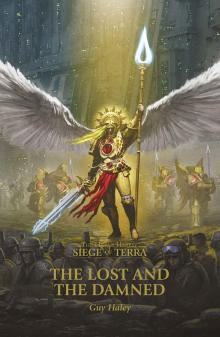 The Lost and the Damned (The Horus Heresy Siege of Terra Book 2)
The Lost and the Damned (The Horus Heresy Siege of Terra Book 2)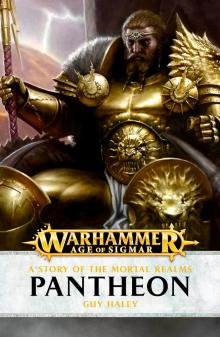 Pantheon
Pantheon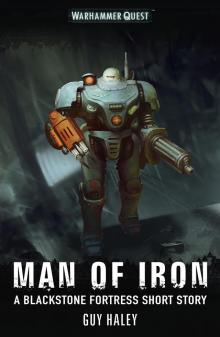 Man of Iron
Man of Iron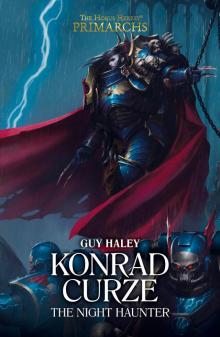 Konrad Curze the Night Haunter
Konrad Curze the Night Haunter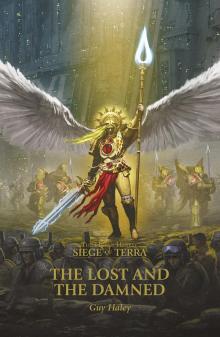 The Lost and the Damned
The Lost and the Damned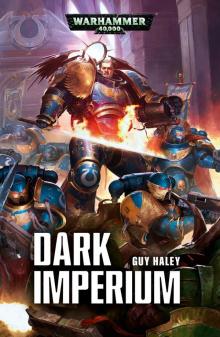 Dark Imperium
Dark Imperium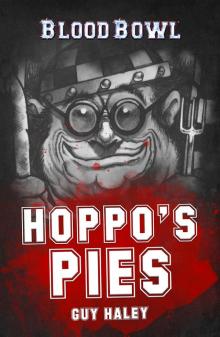 Hoppo's Pies
Hoppo's Pies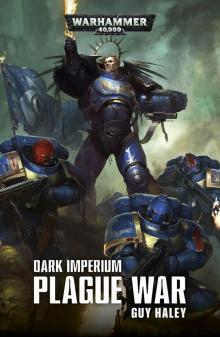 Dark Imperium: Plague War
Dark Imperium: Plague War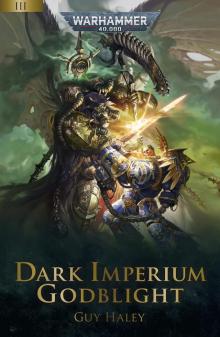 Dark Imperium: Godblight
Dark Imperium: Godblight Crash
Crash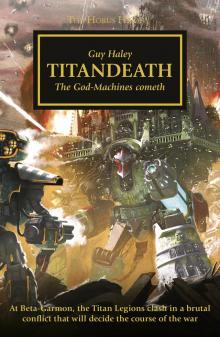 Titandeath
Titandeath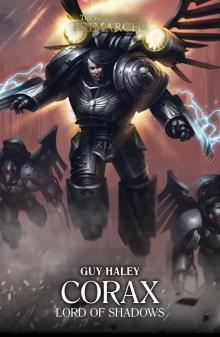 Corax- Lord of Shadows
Corax- Lord of Shadows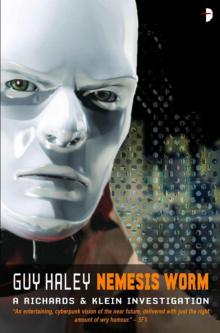 The Nemesis Worm
The Nemesis Worm Wolfsbane
Wolfsbane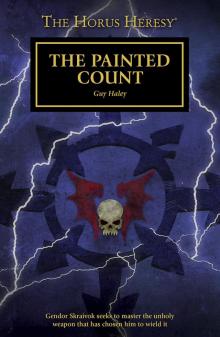 The Painted Count
The Painted Count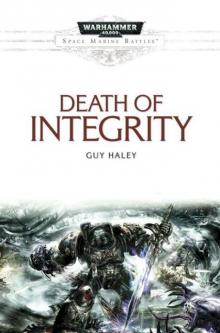 The Death of Integrity
The Death of Integrity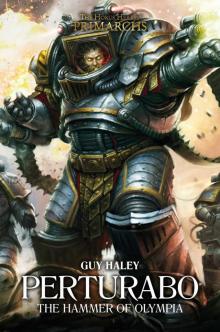 Perturabo: Hammer of Olympia
Perturabo: Hammer of Olympia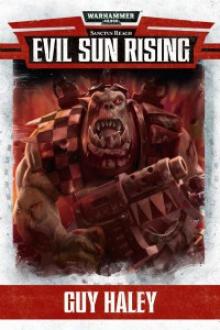 Evil Sun Rising
Evil Sun Rising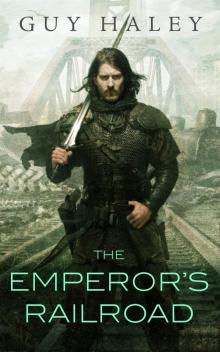 The Emperor's Railroad
The Emperor's Railroad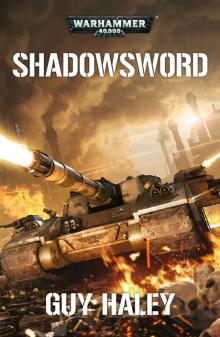 Shadowsword
Shadowsword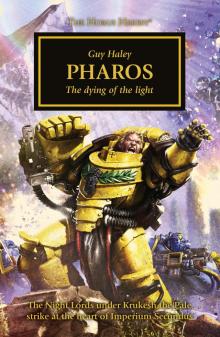 Pharos
Pharos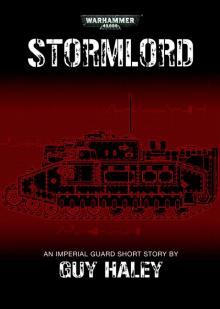 Stormlord
Stormlord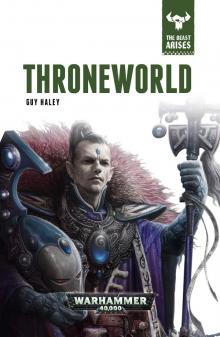 Throneworld
Throneworld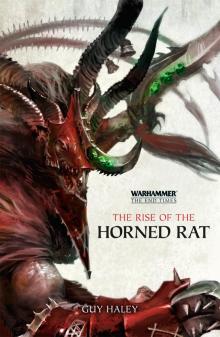 The End Times | The Rise of the Horned Rat
The End Times | The Rise of the Horned Rat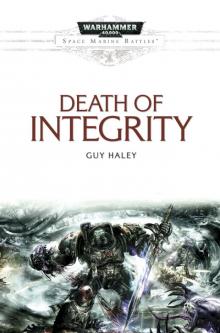 Death of Integrity
Death of Integrity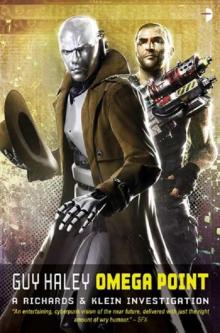 Omega Point
Omega Point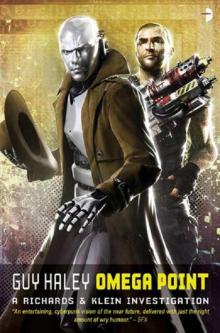 Omega point rak-2
Omega point rak-2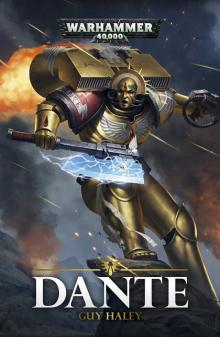 Dante
Dante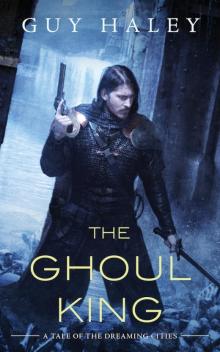 The Ghoul King
The Ghoul King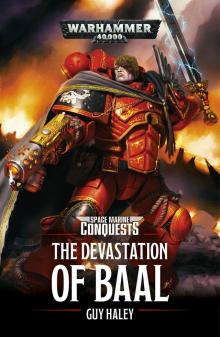 The Devastation of Baal
The Devastation of Baal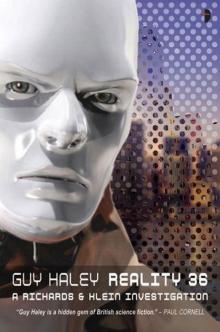 Reality 36: A Richards & Klein Novel
Reality 36: A Richards & Klein Novel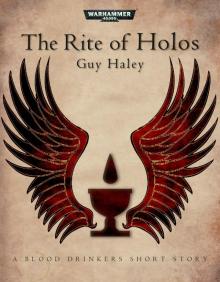 The Rite of Holos
The Rite of Holos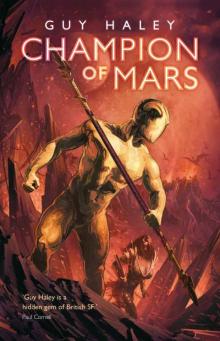 Champion of Mars
Champion of Mars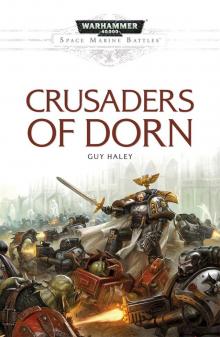 Crusaders of Dorn
Crusaders of Dorn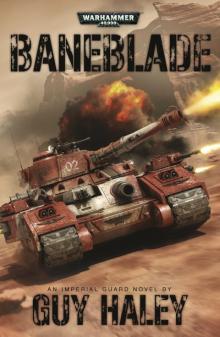 Baneblade
Baneblade